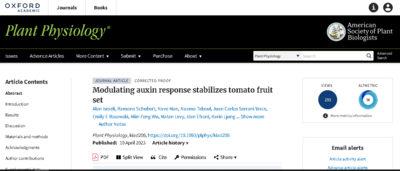Modulating auxin response stabilizes tomato fruit set.
Successful pollination of tomato plants is highly dependent on the weather. In cool temperatures, pollination of the flowers is inefficient and results in yield losses. The phytohormone auxin generally has a beneficial effect on pollination and fruit set. Local auxin applications under cool, inefficient pollination conditions are therefore used in tomato production to increase fruit set. IPB scientists, in collaboration with partners from Israel and America, have tested how different auxin response factors (ARFs) affect tomato fruit development and growth.
Class A auxin response factors (Class A ARFs) act as transcription factors to activate the expression of auxin-induced genes in the presence of auxin, whereas in the absence of the phytohormone they bind to repressors and inhibit the expression of these genes. In tomato plants, seven different Class A ARFs are known to date, some of which have overlapping functions and regulate growth in different tissues. Negative feedback loops and other incoming signals lead to different gene dosages of these ARFs, resulting in diverse and complex responses to specific physiological challenges.
In their study, the scientists wanted to determine whether reducing ARF activity would improve tomato yield stability under fluctuating temperatures. To do so, they inhibited the activity of different ARF genes and analyzed the yields of the mutant plants under different warm and cold growing conditions. Indeed, plants with a reduced amount of ARF8A and ARF8B transcription factors produced significantly higher yields than the corresponding wild-type plants in both warm and cold environments. The good yield of the mutants was due to early fruit set, more fruit-bearing branches, and generally more flowers. In addition, the ARF8-reduced plants and also some other mutant combinations produced seedless parthenocarpic fruits.
In future, breeders could use ARF8 mutations to increase yield stability in tomatoes and other crops, the scientists concluded.



